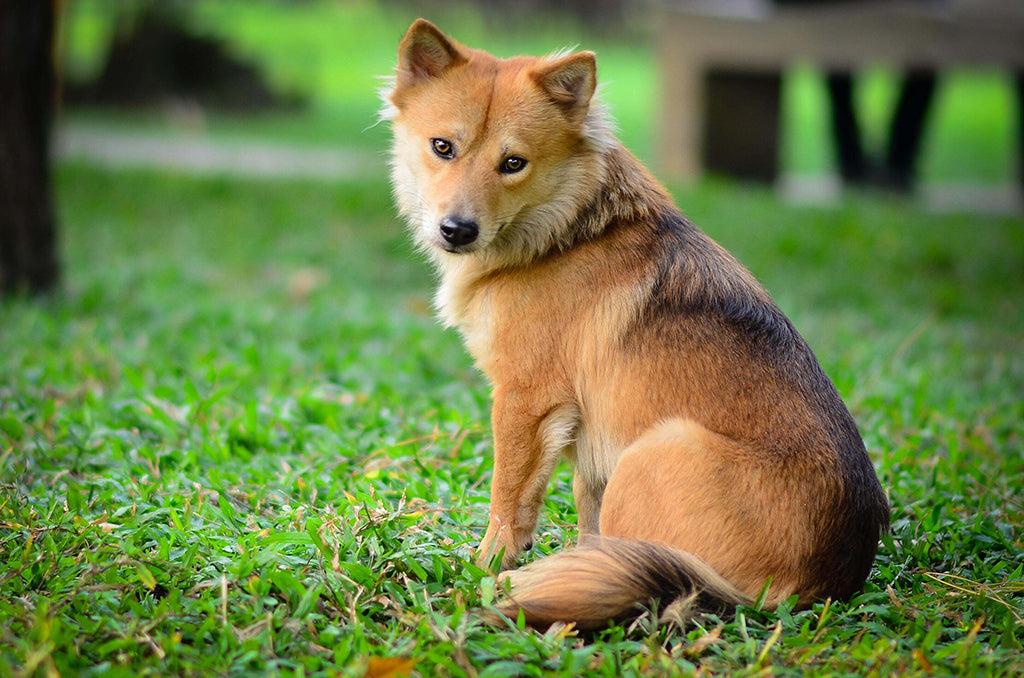Learn how to prevent your dog’s pee and poop from turning your lawn brown or killing your grass. Find out why it can do this in the first place and tips for stopping brown spots in the grass from dog pee. Read on to find out more…
Dog Pee Turning Lawn Brown? Here’s What To Do

Why Does Dog Pee Kill Grass?
We love our pets to pieces, but we also love our yards to look their best. So, why is your dog’s pee turning your lawn brown?
Firstly, this is natural – there’s nothing wrong with your pooch. However, a dog’s waste contains nitrogen which comes about from the process of protein being broken down in the body. When they relieve themselves in the yard, the grass essentially becomes “burnt” from the nitrogen. It’s thought that salt and other compounds in dog pee may also contribute to grass discoloration.
Oddly though, the grass around the patch they’ve peed may appear greener as these roots will absorb the leftover nutrients from your pup’s urine!
Female dog’s and male dog’s urine doesn’t differ in contents so it doesn’t matter what sex your dog is – both can turn a lawn brown.

How To Combat Brown Spots In Grass From Dog Pee
Here are a few tips and tricks to help get your lawn looking plush again…
Walk your pup first thing in the morning; this will ensure they’re peeing and pooping off your lawn! Just make sure it isn’t somebody else’s lawn and you bag up any of their poop on route.
Pick up their poop immediately; the longer you leave it lying on your lawn, the more damage it will do to the grass. Pick up after them straight away (and try to use biodegradable poop bags where possible as these are better for the environment)!
Hose down the patch after they pee; water down the spot they’ve peed on in the yard as soon as they’re done either with a hose, watering can, or glass of water. This will help dilute it. Regularly watering your lawn and plants will help keep every chemical that finds its way onto it diluted and thus help your lawn keep looking fresh too. Regular watering will also make it easier to repair any pee/poop damage that may arise.
Increase their water intake; you could consider changing their food to a wet-food, meat-based diet instead of kibble to help keep them hydrated which will, in turn, dilute their urine. Always make sure they have a clean, full, freshwater bowl accessible to them at all times too so they don’t dehydrate – this will not only benefit their health and happiness but your lawn’s health and happiness too!
If you have a male dog, invest in a “pee post”; pee posts are designed to sit in your lawn and encourage your male dog to pee up it. Then most of the pee goes on the post, instead of the lawn.
If you use fertilizer, consider switching to a low nitrogen brand; otherwise, you’ll be adding to the nitrogen load in the lawn. However, always, always, always make sure that your fertilizer of choice is verifiably pet safe.

Plant a urine-resistant ground cover in the area you want your dog to pee/they like; something like clover is good, or others that have been touted are rye and fescue grass. These tend to be more resilient and resistant to urine damage than your average lawn grass.
Kindly and ethically train your dog to pee in a designated area; via positive, reward-based training with treats you could try and teach your dog to pee in your place of choice. Remember though, do not punish them for peeing in the ‘wrong’ place – this will just induce fear in your pup and they may learn to fear peeing outside at all! Simply reward them when they pee in the desired location and simply ignore them when they pee in the non-desired location. This can take a few weeks, so extend patience and pour clean water over the patches you don’t want during their learning phase.
If My Dog’s Pee Is Turning The Lawn Brown, Would Supplements Help?
No. If a supplement claims to sort the natural pH levels of your dog’s pee, this won’t help your lawn. These products will simply cause health problems for your dog, like bladder stones and potential infections.
There are some companies out there who promote products that claim to help your dog’s pee from killing your grass without changing the natural pH levels. You may know these as “dog rocks”. But, always buy from a reputable brand, research the product thoroughly, seek out trustworthy reviews and ask the opinion of your vet.
Remember, other neighboring animals may be using your lawn as a toilet too so it may not just be your dog’s urine causing the problem. The best bet is to keep watering down your grass on a regular basis to dilute any nitrogen in your dog’s, or another animal’s waste, down.
Sources
“Vet Q&A: How Can I Stop Dog Pee Killing Grass?” PDSA UK, Jun 10. 2020 https://www.pdsa.org.uk/what-we-do/blog/vet-qa-how-can-i-stop-dog-pee-killing-grass
Author Stregowski, Jenna “How to Stop Dog Urine From Damaging Your Grass” Spruce Pets, Jun 09. 2021 https://www.thesprucepets.com/dog-urine-brown-spots-on-grass-1118287
Author Granshaw, Lisa “Prevent Pet Waste From Killing Your Lawn” Vet Street, Oct 13. 2013 http://www.vetstreet.com/our-pet-experts/prevent-pet-waste-from-killing-your-lawn
 S
S



